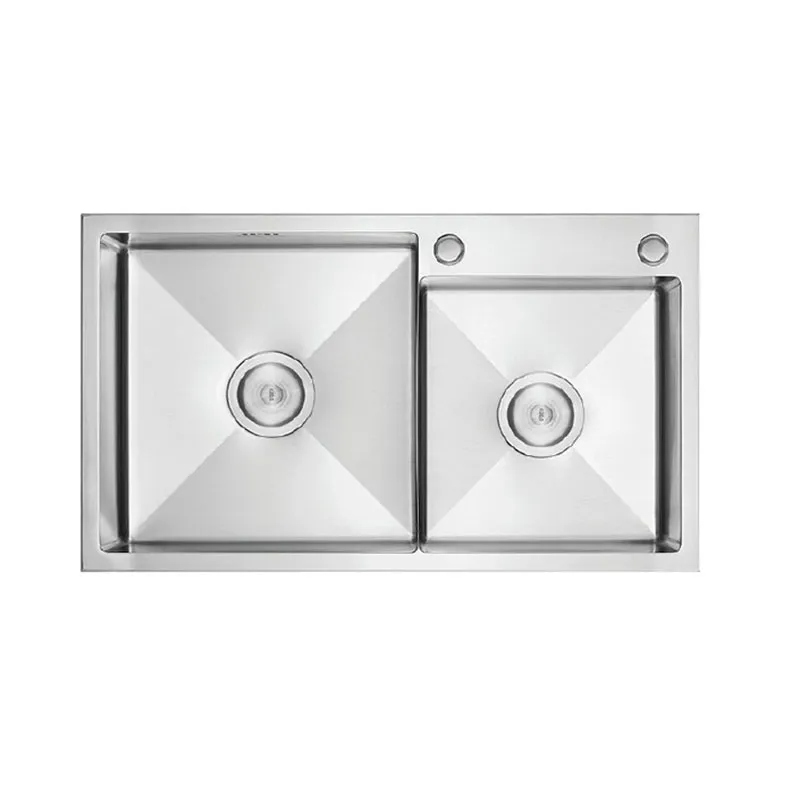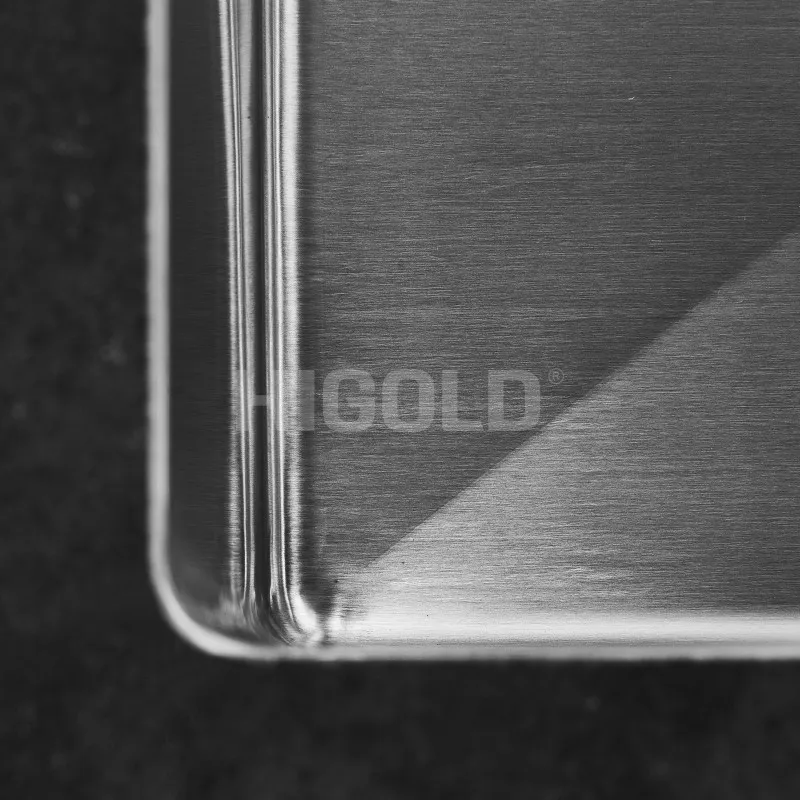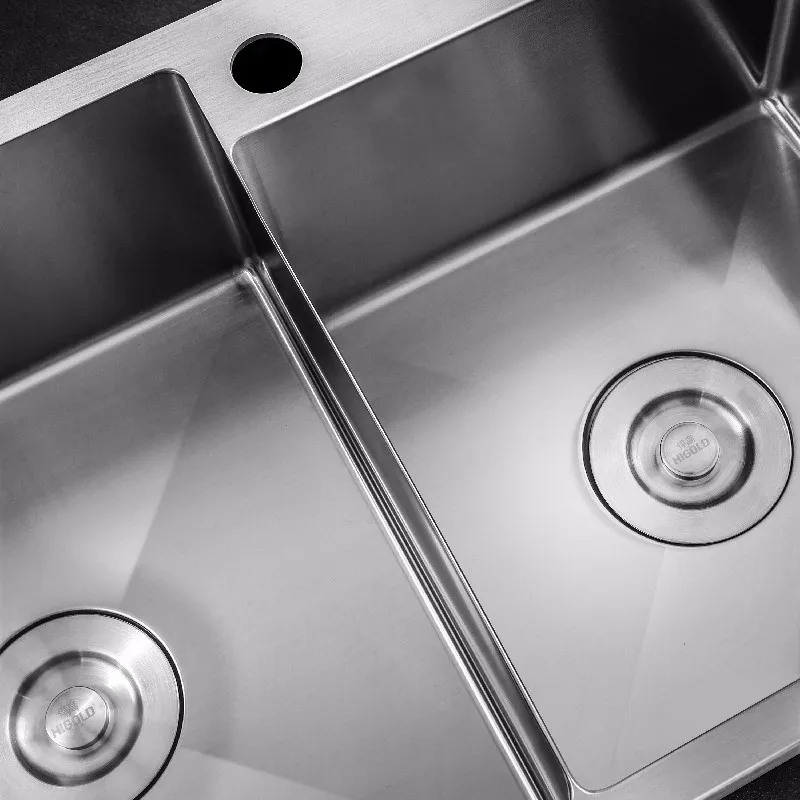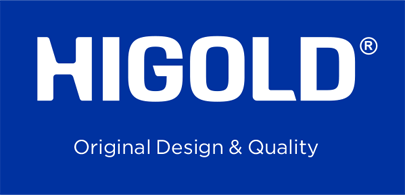Stainless steel kitchen sinks are widely used in modern kitchens because of their durability, corrosion resistance, and easy cleaning. However, although stainless steel is a very strong and durable material, it still needs some protection during use. In daily use, some items and substances may affect the appearance and performance of the stainless steel kitchen sink, causing scratches, corrosion, discoloration and other problems on the surface of the sink. In order to extend the service life of the stainless steel kitchen sink and avoid unnecessary damage, we need to understand which items and substances should not come into contact with the stainless steel kitchen sink.
This article will comprehensively analyze the substances that should be avoided when using a stainless steel kitchen sink, helping consumers to protect the sink in daily use, ensuring its long-lasting beauty and maximum use efficiency.

What are the characteristics of a stainless steel kitchen sink?
Stainless steel kitchen sinks are widely used in home kitchens. Their biggest features are durability, corrosion resistance, easy cleaning, and a simple and modern appearance. Common stainless steel kitchen sinks are mostly made of 304 stainless steel, which has strong acid and alkali resistance, corrosion resistance and oxidation resistance, and can withstand common use requirements in the kitchen.
However, despite the strong corrosion resistance of stainless steel, certain chemicals, hard substances or long-term external environmental influences may still have adverse effects on the surface of stainless steel kitchen sinks. Therefore, understanding these potential risks and taking corresponding protective measures are essential to extend the service life of the sink.
What should you avoid when using a stainless steel kitchen sink?
1. Strong acidic or alkaline detergents
Although stainless steel is resistant to oxidation and corrosion, strong acidic or alkaline chemicals may still corrode its surface. Common strong acidic detergents (such as hydrofluoric acid) and strong alkaline detergents (such as ammonia) may cause the metal layer on the surface of stainless steel to be destroyed, which may cause discoloration, corrosion or spotting of the sink.
● Hydrofluoric acid: This acidic substance is often used to clean some industrial equipment, especially when removing certain types of metal oxides, but it is very corrosive to stainless steel. If it comes in contact with the sink accidentally, it may quickly damage the surface of the sink and even cause corrosion marks on the surface of the sink.
● Ammonia: Among common household cleaners, ammonia has a strong alkalinity when cleaning. Long-term use will cause spots or uneven color spots on the stainless steel surface. When using these cleaners, be sure to rinse thoroughly after use.
● Bleach: As a strong oxidant, bleach will damage the surface protective film when it comes in contact with the stainless steel kitchen sink for a long time, causing metal corrosion and even pitting. When using bleach, be sure to avoid direct contact with the sink. It is best to use a diluted solution and clean it in time.
2. Acidic substances in food
Stainless steel kitchen sinks often come into direct contact with food, especially acidic foods such as citrus fruits, vinegar, tomatoes, etc. If acidic substances come into contact with the stainless steel surface for a long time, it may cause corrosion marks or discoloration on the surface.
● Citrus fruits: The citric acid in citrus fruits such as oranges and lemons is highly acidic. If not cleaned in time and left in contact with the sink surface for a long time, it may affect the appearance of the sink, especially in scratched areas.
● Vinegar: Although vinegar is a common condiment in everyday kitchens, its acidic components can corrode the surface of the stainless steel kitchen sink. Containers or residues that have been used with vinegar may cause damage to the sink surface if they are not rinsed in time.
● Acidic vegetables such as tomatoes: Strongly acidic ingredients such as tomatoes and sauerkraut may also have a corrosive effect on the sink surface if placed directly in the sink for too long.

3. Strong salt
Salt is a substance that can accelerate metal corrosion, especially in humid environments. High concentrations of salt or long-term salt residues can cause corrosion or rust on the surface of the stainless steel kitchen sink. Even salt, which is common in the kitchen, may leave spots or marks on the sink surface, especially if the area around the sink is not wiped and cleaned in time.
● Salt: The particles of salt form a film on the surface of the sink, especially in a humid environment, which may accelerate the corrosion process. After washing the ingredients, be sure to rinse the sink thoroughly.
● Seawater: If the sink is often in contact with seawater or salt water, the accumulation of salt will accelerate the oxidation process of the sink. In the long run, it may cause white salt spots on the surface of the sink and even affect the durability of the sink.
4. Hard substances or sharp objects
Even if the surface of the stainless steel kitchen sink has strong scratch resistance, long-term contact with hard substances or sharp objects may still cause scratches. In particular, steel wool, sharp knives, etc. may damage the gloss of the sink surface and cause the sink to lose its original beauty.
● Steel wool: Although steel wool is very effective in the cleaning process, it will cause great wear on the stainless steel surface, especially when too much force is used, which may leave obvious scratches. When using it, you should avoid using steel wool directly to clean the sink surface. You can choose a more gentle cleaning tool.
● Sharp objects: If sharp knives and hard objects (such as ironware, hard ceramic tableware, etc.) fall into the sink, they may cause scratches on the sink surface, especially when the sink surface is shiny, the scratches will be more obvious. To avoid this, avoid placing sharp objects in the sink, or place knives and other objects on a special cutting board.
5. Fuel, oil stains and oily substances
If oil stains or oily substances such as fuel are in contact with the stainless steel kitchen sink for a long time, they may also cause discoloration or oil stains on the surface of the sink. Although stainless steel has strong cleaning ability, if oily substances are not cleaned in time, they will still affect the surface of the stainless steel kitchen sink over time.
● Oil stains: Cooking oil, seasoning oil, etc. are often exposed in the kitchen. If oil stains stay in the sink for a long time, they may form a greasy feeling and affect the appearance of the sink. Timely cleaning of oil stains and stains can avoid leaving marks on the surface of the stainless steel kitchen sink.
● Fuel and chemical oils: Sometimes the kitchen may need to use some chemical oils (such as some industrial oils). If these oils come into direct contact with the stainless steel kitchen sink, they may cause oil accumulation or discoloration on the surface of the sink, and even cause corrosion of the sink in severe cases.
6. Too high or too low temperature
Although stainless steel exhibits good heat resistance within a certain temperature range, sudden temperature changes or extreme high temperatures may still cause the stainless steel kitchen sink to deform, crack, and other problems. Especially in winter, too low temperatures may cause the sink surface to be impacted, while in summer, high temperatures may have a negative impact on the surface coating.

How to protect the stainless steel kitchen sink?
In order to maintain the beauty and service life of the stainless steel kitchen sink, in addition to avoiding contact with the above substances, the following measures can also be taken to protect the sink:
● Regular cleaning: Use a mild detergent and soft cloth to wipe the sink regularly to avoid the accumulation of chemicals.
● Avoid direct contact with sharp objects: Avoid direct contact with the sink when using knives to avoid scratching the surface with hard objects.
● Keep dry: After use, wipe the sink dry in time to avoid long-term accumulation of water stains.
● Avoid direct contact with high temperature: Do not put hot pots, hot pot covers, etc. directly into the sink to avoid damage to the sink due to temperature differences.
Top Stainless Steel Sinks and Faucets at Discounted Prices
At Higold Group, we manufacture top-quality stainless steel kitchen sinks and faucets at discounted prices. We specialize in bulk orders and offer customized solutions for all your kitchen needs. Our stainless steel products are made from high-grade SUS304 steel and are available at wholesale rates. Whether you need a large volume order or a customized design, we are here to provide cost-effective solutions. Contact us now for special offers, competitive pricing, and fast delivery.


